Harper Cancer Research Institute's 2nd Annual Research Day
Dr. Anil K. Sood, Professor of Gynecologic Oncology and Cancer Biology at the MD Anderson Cancer Center, was the Keynote Speaker to a capacity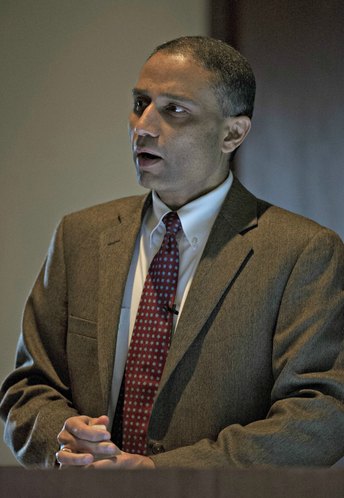 crowd in
crowd in
Raclin-Carmichael Hall at the Second Annual HCRI Research Day on April 15. Sood’s address on “Promises and Challenges of RNAi Therapeutics” described a variety of approaches, several of which are currently in early stage clinical trials, for nanoparticle-based delivery of novel therapeutics to treat women with advanced ovarian cancer. Due to the extreme genetic heterogeneity in ovarian cancer, Sood’s novel approach involves targeting specific short interfering RNA, or siRNA, molecules combined with assessment of drug efficacy by measuring a panel of protein markers using ‘reverse phase array’ technology.
The Keynote address was followed by research updates from four current grantee teams funded by the Walther Cancer Foundation [http://www.walther.org/] Advancing Basic Cancer (ABC) research grant mechanism. Dr. H. Chia Chang, Professor of Chemical & Biomolecular Engineering, described progress in his collaboration with Dr. M. Sharon Stack, Professor of Chemistry & Biochemistry, to develop a microfluidic-based sensor for microRNA 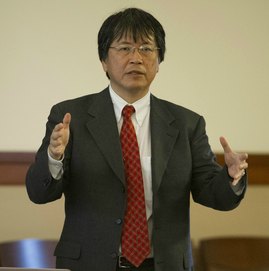 profiling of oral cancer. The goal of this device is early detection of oral cancers associated with human papillomavirus (HPV) infection. Dr. Amanda Hummon, Assistant Professor of Chemistry & Biochemistry, reported on her collaboration with Dr. Paul Bohn, Professor of Chemical and Biomolecular Engineering, to develop correlated mass spectrometric and confocal Raman spectroscopic imaging technologies for analysis of colon cancer spheroids. Using this approach, Hummon showed the ability to assess distribution of common chemotherapeutics throughout the 3-dimensional spheroid. Professor Brian Baker from the Department of Chemistry & Biochemistry showed progress in evaluating structural interactions between T-cell receptors and their target peptide antigens on melanoma cells, and approaches to
profiling of oral cancer. The goal of this device is early detection of oral cancers associated with human papillomavirus (HPV) infection. Dr. Amanda Hummon, Assistant Professor of Chemistry & Biochemistry, reported on her collaboration with Dr. Paul Bohn, Professor of Chemical and Biomolecular Engineering, to develop correlated mass spectrometric and confocal Raman spectroscopic imaging technologies for analysis of colon cancer spheroids. Using this approach, Hummon showed the ability to assess distribution of common chemotherapeutics throughout the 3-dimensional spheroid. Professor Brian Baker from the Department of Chemistry & Biochemistry showed progress in evaluating structural interactions between T-cell receptors and their target peptide antigens on melanoma cells, and approaches to
engineer the receptors for enhanced ligand binding affinity. Together with Dr. Peter Velasquez, formerly of IU-SOM-SB,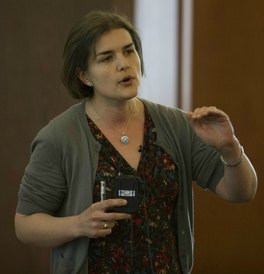 the translational target of this project is to enhance the immune response against melanoma antigens. The session was completed by Dr. Kevin Vaughan, Associate Professor of Biological Sciences, describing his collaboration with Dr. Richard Taylor, Professor of Chemistry & Biochemistry. Taking advantage of the microtubule binding properties of a class of compounds known as epithilones, the team is developing “Trojan Horse” therapeutics that chemically couple an Aurora kinase inhibitor to the drug for dual target efficacy. Preliminary results show that inhibition of this kinase disrupts cell cycle progression through a previously undescribed mechanism.
the translational target of this project is to enhance the immune response against melanoma antigens. The session was completed by Dr. Kevin Vaughan, Associate Professor of Biological Sciences, describing his collaboration with Dr. Richard Taylor, Professor of Chemistry & Biochemistry. Taking advantage of the microtubule binding properties of a class of compounds known as epithilones, the team is developing “Trojan Horse” therapeutics that chemically couple an Aurora kinase inhibitor to the drug for dual target efficacy. Preliminary results show that inhibition of this kinase disrupts cell cycle progression through a previously undescribed mechanism.
An awards ceremony followed the oral presentations. Sponsored by Mr. Albert Gutierrez, President and CEO of St. Joseph’s Regional Medical Center (SJRMC) [http://www.sjmed.com/], the SJRMC Seeding Research in Cancer (SJMRC-SRC) awards provide $25,000 in pilot funding for research targeting breast cancer. The 2012-2013 SJRMC-SRC grant was awarded to Drs. Ryan Roeder (Associate Professor of Aerospace & Mechanical Engineering) and Tracy Vargo-Gogola (Assistant Professor of Biochemistry & Molecular Biology) for their project “Contrast-Enhanced X-Ray Detection of Breast Microcalcifications in a Murine Model of Radiographically Dense Mammary Tissue”. The goal of this project is to investigate the translational potential of bisphosphonate-functionalized gold nanoparticles to provide a more sensitive diagnostic tool for imaging of microcalcifications in radiologically dense breast tissue. Notice of intent to fund a second SJRMC-SRC project in 2013-2014, to Dr. Laurie Littlepage (Assistant Professor of Chemistry & Biochemistry) was also announced. Dr. Littlepage’s research project, entitled “Gene Expression Profiling of a Unique Population of Breast Cancer Patients to Identify Novel Molecular Signatures in African-American Women” is aimed at investigating novel genetic signatures in breast cancers from African-American women.
The oral presentations followed a poster session highlighting the outstanding multi-disciplinary research contributions from undergraduates, graduate students, post-doctoral fellows, and special contributors. Over 70 posters were presented, with trainee representatives from the Colleges of Science, Engineering, and Arts & Letters at the University of Notre Dame; Indiana University (IU) School of Medicine South Bend; and special contributors from IU Health-Goshen Hospital. Cash prizes were awarded to the top three poster presenters in each of the following categories:
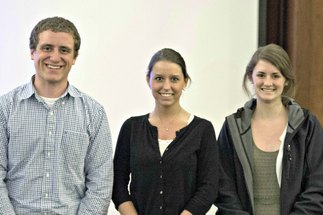
Undergraduates:
1st place – Lucy Smith (L. Littlepage, Mentor) “ZNF217 Interacts with the Tumorigenic Isoform of Pyruvate Kinase PKM2”
2nd place – Andjela Pehar (J. Prosperi, Mentor) “Gene Expression Changes Downstream of APC Loss Predict Tumor Phenotype”
3rd place – Matthew Metzinger (M.S. Stack, Mentor) “Developing a Mouse Model for Epithelial Ovarian Cancer and Obesity Studies”
Graduate Students:
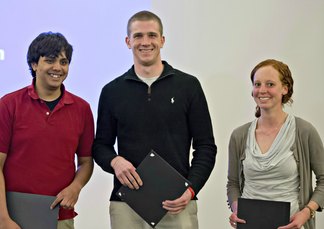
1st place – Lisa Cole (R. Roeder, Mentor) “Bisphosphonate-Functionalized Gold Nanoparticles Enable Enhanced X-Ray Detection of Breast Microcalcifications”
2nd place – Eric Weaver (A. Hummon, Mentor) “Mass Spectrometric Analysis of Three-Dimensional Cell Culture Systems”
3rd place – Raju Rayavarapu (Z. Schafer, Mentor) “The Role of Cell-Cell Contacts in the Survival of Extracellular Matrix Detached Mammary Epithelial Cells”
Post-doctoral Fellows: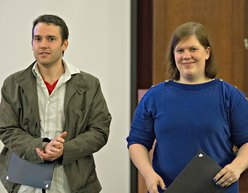
1st place – Lynn Roy (K. Cowden-Dahl, Mentor) “An In Vivo Examination of the Effects of ARID3B on Ovarian Cancer Metastasis in Nude Mice”
2nd place – Bill Hawse (B. Baker, mentor) “A Dynamically Driven Mechanism for T Cell Signaling”
3rd place – Dorothy Ahlf (P. Bohn, mentor) “Correlated Imaging Mass Spectrometry and Raman Spectroscopy for Oncology and Drug Resistance”